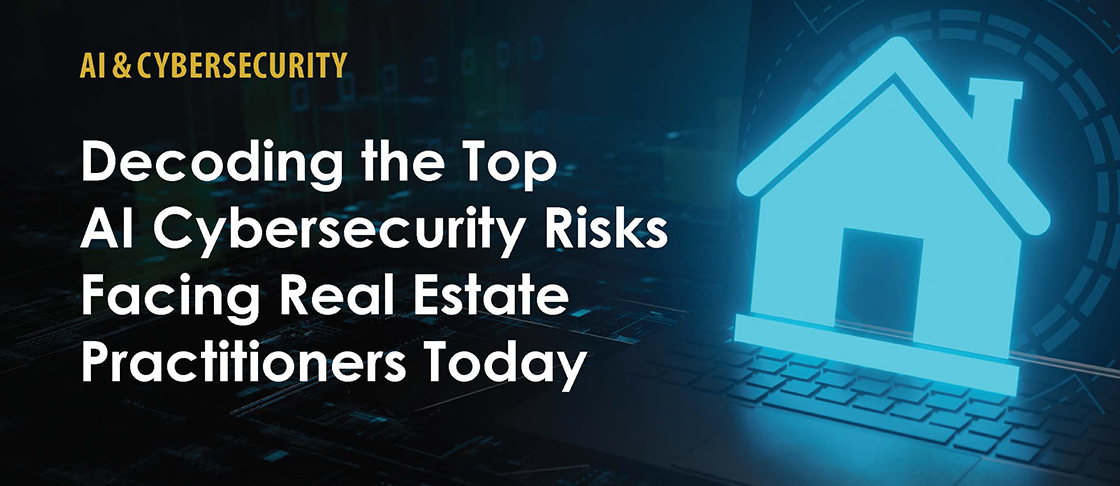Decoding the Top AI Cybersecurity Risks Facing Real Estate Practitioners Today

 BY “TRACEY, THE SAFETY LADY” HAWKINS
BY “TRACEY, THE SAFETY LADY” HAWKINS
Owner of Safety and Security Source
Since the end of 2022, artificial intelligence (AI) has become widely accessible, offering productive and “magical” tools. However, cybercriminals are exploiting these very tools to deceive and defraud unsuspecting individuals.
Real estate professionals are learning to use ChatGPT to write listing descriptions, blog posts, social media updates and develop marketing strategies. However, they need to be aware of the cybersecurity risks involved.
Let’s dive into the realm of AI-related cybercrimes impacting the real estate industry, and uncover the good, the bad and the solutions to five of the most crucial cyber threats.
THE CRIME: DATA BREACH
THE GOOD:
Real estate agents often serve as the primary point of contact when gathering consumer information, acting as trusted custodians or intermediaries to ensure this information reaches the appropriate real estate professionals.
THE BAD:
In the unfortunate event of a real estate agent’s database getting hacked, it exposes sensitive client data, including social security numbers, bank account details, financial information, and personal addresses. A compromised device belonging to a real estate agent also puts their clients’ details at risk, making them vulnerable to cybercriminals.
When real estate agents input client information into AI tools such as ChatGPT to create reports or marketing materials, it inadvertently exposes this information to potential cyber threats. Although agents can direct ChatGPT to generate personalized documents, they must exercise caution and avoid entering specific client data directly, as doing so could lead to the unintentional public disclosure of sensitive information.
THE SOLUTION:
1. Agents should regularly update their password hygiene, using strong passphrases or pass sentences instead of easily guessable passwords.
2. Enable two-factor authentication on all devices to add an extra layer of security, requiring a secondary code for logins, thwarting cybercriminals’ attempts.
3. Vigilantly exercise caution when clicking on links or downloading information from unknown sources, as they may harbor malware or viruses that can compromise data security.
THE CRIME: PHISHING SCAMS
THE GOOD:
Real estate agents can utilize ChatGPT to generate HTML code for developing websites, landing pages, and other web assets. Many website builders offer a simple process of copying and pasting HTML code, enabling agents to swiftly create fully functional websites and landing pages to drive leads and expand market reach.
THE BAD:
AI empowers cybercriminals to craft more persuasive phishing scams, including the creation of lifelike fake websites that deceive real estate agents and consumers into revealing sensitive information. Professional-looking websites and landing pages entice users to click on links and download content, unknowingly exposing them to viruses and malware that put their data at risk.
THE SOLUTION:
To counter potential threats, always verify the authenticity of website sources. “Hover” over website addresses to confirm their legitimacy and conduct a Google search on the company, cross-referencing the website address before clicking any links. It is essential to caution consumers when encountering websites shared during real estate transactions and to proceed with care.
THE CRIME: RANSOMWARE ATTACKS
THE GOOD:
AI tools offer companies a means to safeguard against cybercrime. By partnering with IT cybersecurity companies, real estate firms can establish proactive practices and procedures, fortifying their defenses against ransomware threats to protect agents and consumers alike.
THE BAD:
Ransomware attacks pose severe risks to real estate companies, rendering their digital systems inaccessible until a ransom is paid. AI empowers cybercriminals to exploit vulnerabilities with greater sophistication and precision. When agents’ social media or email accounts are compromised, sensitive consumer information becomes vulnerable. Cybercriminals demand payment to restore access, but law enforcement discourages compliance. The repercussions of non-payment could be dire for agents and their businesses.
THE SOLUTION:
Implementing robust password practices serves as an essential preventive measure against these cybercrimes. By prioritizing strong, unique passwords and regularly updating them, real estate professionals can mitigate potential threats to their digital infrastructure.
THE CRIME: DEEPFAKE FRAUDS
THE GOOD:
Real estate agents have access to AI tools such as Synthesia, enabling them to create “faceless” videos by representing themselves through AI-generated images while delivering the intended message with scripted content.
AI technologies like Midjourney, Dall-e, and Lexica provide text-to-image capabilities, allowing users to generate images, pictures, and videos featuring non-existent entities, locations, and individuals. When used responsibly, these tools can enhance marketing efforts, subject to ethical considerations, fair housing regulations, and other legal limitations.
THE BAD:
Cybercriminals exploit AI to produce deepfakes, deceptive video or audio content that closely resembles authentic recordings, making it challenging to discern their falsity. In the real estate industry, deepfakes could be employed to fabricate fraudulent endorsements or testimonials, deceiving potential buyers or sellers into engaging with non-existent or misrepresented properties.
In addition, cybercriminals can fabricate properties to attract short-term rental clients or buyers, inducing them to pay deposits for non-existent real estate. Additionally, they can create fake images and videos of individuals posing as agents, disseminating false information or making deceptive statements.
THE SOLUTION:
To counter the threat of deepfakes and safeguard the integrity of real estate transactions, the utilization of AI detector tools like GPT Zero is recommended. Although these technologies are relatively new and not entirely infallible, they serve as essential tools to identify and mitigate the impact of deceptive AI-generated content.
AI can be a powerful tool for the real estate industry, but it must be used responsibly and securely. Real estate companies should implement plans to address potential cybersecurity incidents with prompt and effective responses. These plans must encompass routine cybersecurity training and drills, aimed at updating and honing the necessary skills to safeguard agents, brokerages and consumers.

